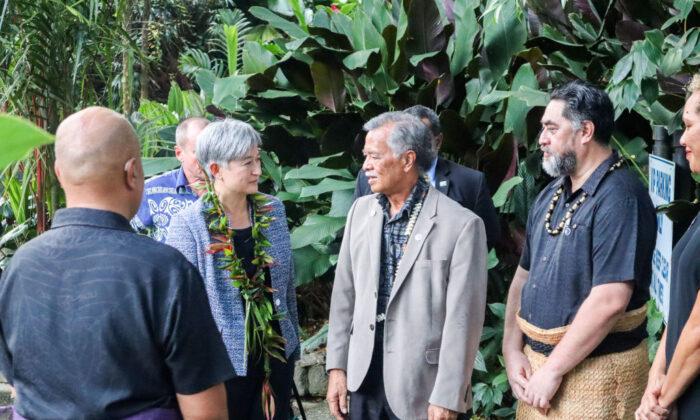The Australian government is continuing its counter to Beijing’s Pacific push, with the Foreign Minister Penny Wong announcing a new media deal with the Marshall Islands on Oct. 14.
Wong is carrying out her eighth official bilateral visit, since her appointment in May, to the Pacific region where she is visiting the nations of the Marshall Islands and Nauru to enhance diplomatic and cultural ties in the region.
Announcing the new media deal between the Marshall Islands broadcaster V7AB and Australia’s national broadcaster, the Australian Broadcasting Corporation, for eight radio shows, Wong said that the deal demonstrated Australia and the Marshall Islands’ desire to have closer bilateral ties.
“We are very keen, and I am personally very committed as Foreign Minister, to telling the stories of our First Nations peoples as part of talking about and communicating who we are, and I know from talking to the minister and others here in the Marshall Islands that the relationship, in particular with the Torres Strait First Nations peoples, is so important, and those connections go back such a long time,” Wong said
“And we want to work together to make sure the region we share, the ocean we share, that is so much a part of your life, your lives and your culture is a region that reflects our shared dreams of sovereignty, of peace, of stability, of respect—respect for each other and respect for the region.”
Wong Warmly Greeted By Pacific Nation
Wong is the first international minister to visit the Pacific nation and received a warm welcome from the Marshall Islands government. The foreign minister of the country, Kitlang Kabua, noted that if the opportunity had arisen, she thought the whole of the nation would have gathered to witness the arrival of the Australian foreign minister.Welcoming the media deal, Kabua said that the agreement would further connect the small Pacific country to other parts of the world.
“The coming of Honourable Minister Penny Wong and her delegation really marks this unique and strong friendship that both of our governments have,” Kabua said.
“We look forward to a fruitful and strengthened partnership between our two countries as we work together to find ways to improve the quality of life for both of our peoples.”
Kabua also alluded to the growing geostrategic competition in the region, saying that both countries face geopolitical situations that put them “in a precarious position.”
Western Nations Countering Beijing with Pacific Pivot
The visit from Wong follows Australia, the U.S., and New Zealand’s decision to pivot their foreign affairs focus to the region to counter China’s Pacific push, which has seen Beijing already ink a security deal with the Solomon Islands that could allow it to establish military facilities at a key strategic location in the region.The pivot, according to Rand Corporation’s senior defence analyst Derek Grossman, is making headway.
Yet concern about Beijing’s intentions is not replicated towards countries like Australia and the U.S, Grossman argues.
“The problem for China is that the United States, along with traditional neighbourhood friends, Australia and New Zealand, remain the dominant and likely preferred force, thus making it difficult for Beijing to break into the region and build its own influence,” he said.
“ It is incumbent on those who oppose Beijing in the Pacific to hone their engagement strategies to prioritize the existential challenge of climate change, pandemic recovery, and economic programs that align with Pacific Islander needs. Doing so should keep China comfortably in the rearview mirror.”




